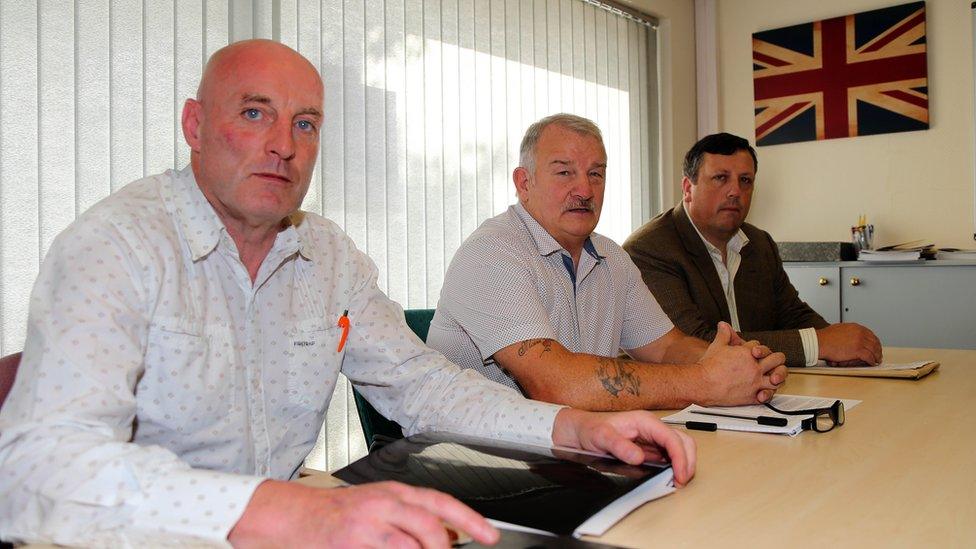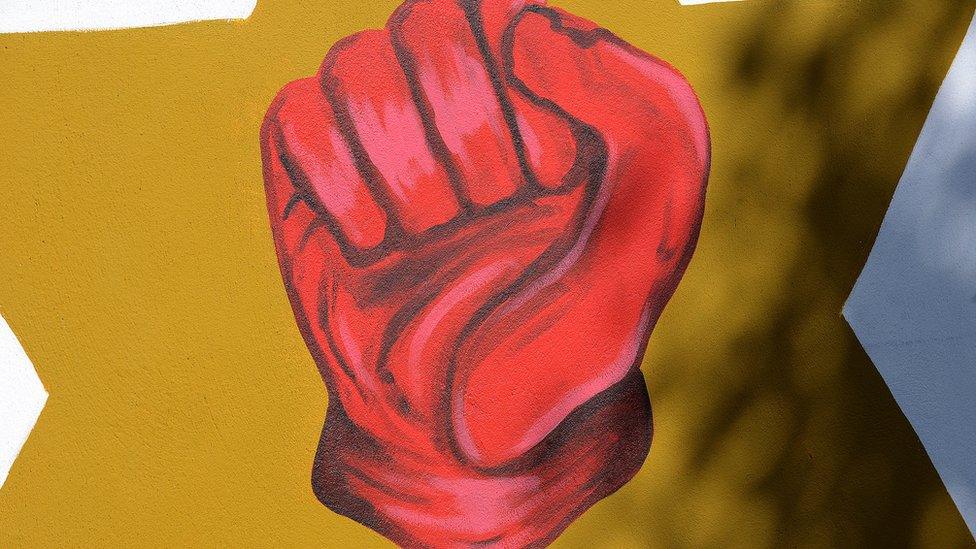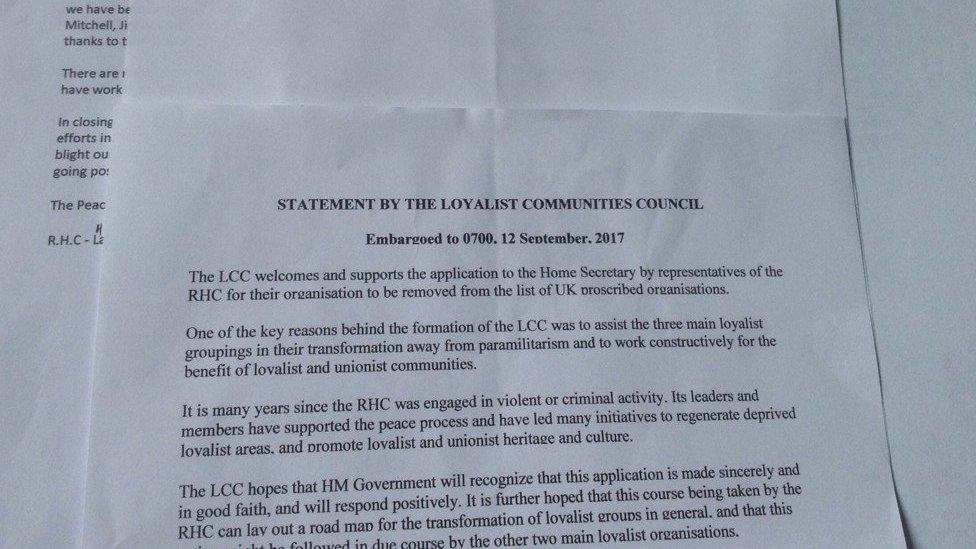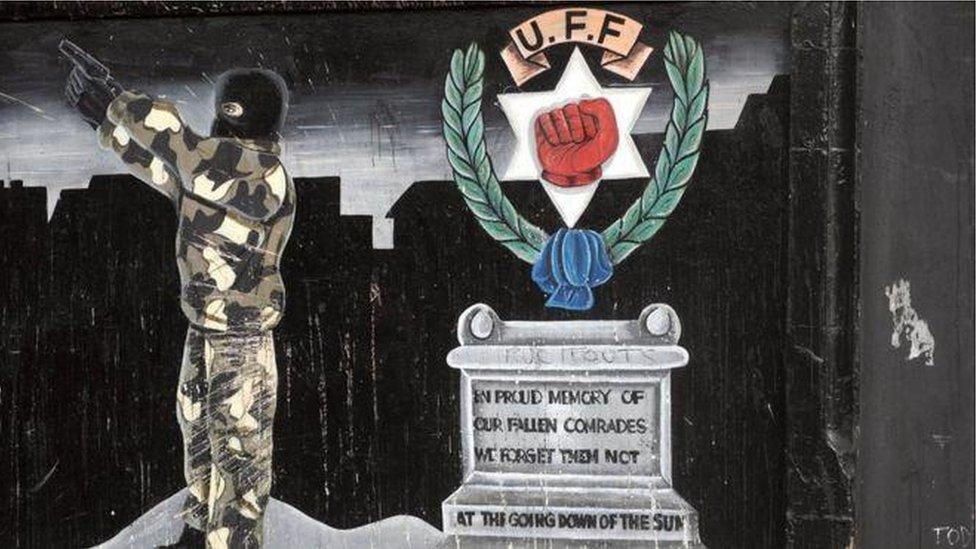Loyalist Red Hand Commando applies to be legalised
- Published

Robin Stewart, Jim Wilson and David Campbell at a press conference announcing the Red Hand Commando had applied to be legalised
The Red Hand Commando, a loyalist paramilitary group, has applied to the Home Office asking to be taken off the list of proscribed organisations.
It is affiliated with the Ulster Volunteer Force, which is blamed for some 500 murders during the Troubles.
It comes 10 years after the group formally ended its armed campaign, in May 2007, external.
The bid came in a 100-page document which was also sent to the Independent Reviewer of Terrorism Legislation, external.
That document laid out the case for the Red Hand Commando to be de-proscribed.
The move has been endorsed by the umbrella group, the Loyalist Communities Council (LCC), and is seen as a test case.
"The LCC hopes that HM government will recognise that this application is made sincerely and in good faith, and will respond positively," said the council.
"It is further hoped that this course being taken by the Red Hand Commando can lay out a road map for the transformation of loyalist groups in general and that this action might be followed in due course by the other two main loyalist groups."
The Home Secretary has 90 days to respond to the application.
Loyalists say, if rejected, an "itemised bill" will set out the reasons why and that a further application can be made within six months.
In October 1994, alongside the UDA and UVF, the group was part of the Combined Loyalist Military Command ceasefire, external.

Between 1966 and 1999 the UVF and the Red Hand Commando reportedly killed nearly 550 people
In its legalisation bid, the Red Hand Commando repeated its apology from the 1994 ceasefire statement, "offering true and abject remorse to all innocent victims of the conflict here".
The final sentence reads: "The peace is harder to win than the war."
Loyalist Communities Council chairman David Campbell said the Red Hand Commando had not engaged in violent or criminal activity for "many years".

A letter from the Loyalist Communities Council in support of the Red Hand Commando move
However, Sinn Féin MLA Gerry Kelly said any move to legalise the Red Hand Commando was "ludicrous".
Mr Kelly said the organisation was created as part of the UVF, which, he said, was still involved in drug dealing and murder.
"Just this week, the Red Hand Commando's partners in the UVF were blamed for a gun attack which targeted a bedroom with three young children in it," he said.
'Veneer of respectability'
Alliance MLA David Ford said the key issue was why the Red Hand Commando was asking to be de-proscribed rather than disbanding of its own accord.
"Alliance has consistently called for a proper strategy to tackle paramilitaries, based on breaking down the structures that exist, not facilitating ongoing community control and organised crime under a veneer of respectability," said the former justice minister.
But the Progressive Unionist Party said the group had "positively engaged in guiding the loyalist community away from violence and paramilitary activity".
Kenny Donaldson of victims group Innocent Victims United said the Red Hand Commando's request was "not appropriate".
"We do not believe that the terror names IRA, UVF/RHC, INLA, UDA etc, should ever become legalised.
"They must be remembered in history for what they were - organisations of oppression with ideologies which encouraged and indeed demanded one neighbour to murder another," said Mr Donaldson.
Intelligence assessment
Journalist and author Brian Rowan, one of the few journalists at a briefing about the application, said the claim would be tested in a security and intelligence assessment that would inform the Home Secretary's decision.
"The Red Hand Commando has put itself up for that fine detail scrutiny," he said.
Former RHC member Jim Wilson told the BBC's Nolan Show that the organisation had been engaged in a process "of trying to work towards a better society" over the last 10 to 14 years.
He offered "true and abject remorse" to the victims of the organisation but said the conflict "was not of our making".
The UK government said proscription decisions in relation to Northern Ireland were a matter for the Secretary of State for Northern Ireland.
"As a general rule, however, we do not comment on individual organisations currently being considered for de-proscription," said a government spokesperson.
- Published6 June 2017
